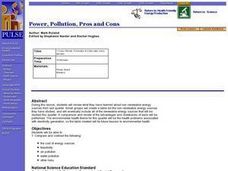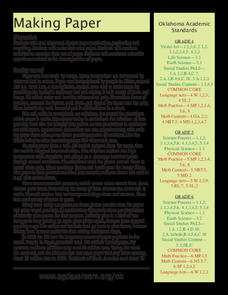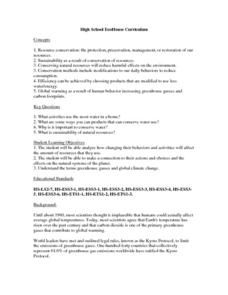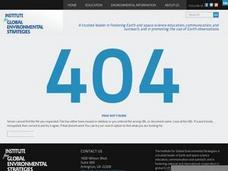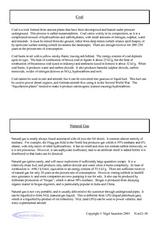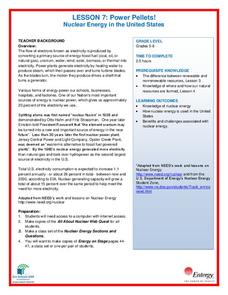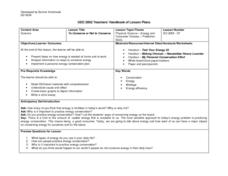Curated OER
Needs and Wants
Students examine the difference between needs and wants. In this consumption lesson plan, students illustrate their needs and wants and discuss their own reasons for buying things. They also discuss the connection between their choices...
Curated OER
Materials, Let's Do the Life Cycle
Students examine environmental and social impacts of products that consumers buy. In this environmental stewardship activity, students play a game that requires them to consider real costs of products. Students consider the environmental...
Curated OER
Class Ketchup
Learners describe statistics by conducting a class cooking activity. In this ketchup lesson, students conduct a class survey based on ketchup consumption habits by learners. Students utilize tomatoes, water and a bottle to create their...
Curated OER
Everyday vs. Extreme Relationships with Nature
Learners examine the interactions with nature and the environment. They discover where water comes from and ways to conserve water. They also examine energy sources and consumption.
Curated OER
Power, Pollution, Pros and Cons
Students review what they know about non-renewable energy, compare and contrast advantages and drawbacks of each type, such as cost of energy sources, feasibility, air pollution, water pollution, and other risks, and create table listing...
Curated OER
Making Paper
Fourth graders investigate the paper usage in their classroom and in other countries by using estimation, counting, and measurement skills. They make paper from recycled paper.
Curated OER
Find the Main Idea
It's important for learners to be able to identify the main point in an article, paper, or essay. Start by having them identify the main idea in a short paragraph. There are three short paragraphs (each with four multiple choice options)...
It's About Time
Renewable Energy Sources - Solar and Wind
There has been a huge solar energy spill! Let's go outside to play in it. This lesson includes multiple experiments showcasing solar and wind energies. Scholars build a solar heater and an anemometer before testing the results. The...
Curated OER
Sustainable Livestock
Students investigate healthy eating habits by researching livestock. In this food sustainability instructional activity, students research the negative impact factory farming has on our environment due to pollution. Students define...
Curated OER
High School EcoHouse Curriculum
How has the level of carbon dioxide changed over recent years, and what is contributing it? Groups work together to research and present their findings in a creative way. Also built into the lesson is a visit to a sustainable house, but...
Consortium for Ocean Science Exploration and Engagement (COSEE)
Carbon Dioxide & Krill: Impacts
What effects do temperature and carbon dioxide levels have on the zooplankton of Antarctica? This concluding lesson plan in a short unit on climate change and the ocean helps environmental scientists answer these questions. After...
National Wildlife Federation
When It Rains It Pours More Drought and More Heavy Rainfall
Which is worse — drought or flooding? Neither is helpful to the environment, and both are increasing due to climate change. The 16th lesson in a series of 21 covers the average precipitation trends for two different climates within the...
PricewaterhouseCoopers
Waste and Recycling: Recycling Paper
We take paper for granted, while thousands of trees are being made into the paper we toss in the trash. Start a dialogue about paper reduction and recycling in class, and share the negative effects paper production has on our ecosystem....
PricewaterhouseCoopers
Waste and Recycling: Recycling and Energy Recovery
Reduce, reuse, recycle, and recover. Young environmentalists learn about the overwhelming amount of garbage produced and discover better ways to minimize their impact on Earth by learning the difference between garbage and recyclables.
Curated OER
CO2 and You
Young scholars study the scientific evidence about carbon dioxide emissions. They learn to calculate the amount of energy used by different appliances. They complete a worksheet which analyzes the amount of energy that their home uses.
Redefining Progress
Have and Have-Not
Is there a correlation between a country's wealth and the extent of its ecological footprint? What exactly constitutes an ecological footprint, and how does one country stack up against the rest? This is a unique lesson to incorporate...
Curated OER
WS 8.4 Percentage Problems
In this percentage instructional activity, students calculate percentages given various types of problems. They calculate percent of compounds in a solution, they calculate mass of compounds given percentages of solutions, and they...
Curated OER
Fuels - The Good, the Bad, and the Ugly
Science pupils choose from twelve questions about five different types of fuel: hydrogen, ethanol, crude oil, natural gas, and coal. They construct a table to compare them and then determine which is the best fuel. Your physical science...
National Wildlife Federation
Power Pellets! Nuclear Energy in the United States
Nuclear power provides about 20 percent of the energy generated in the United States. The seventh activity in the series of 12 tackles nuclear power. After sharing what they know about nuclear energy, scholars complete a WebQuest make a...
Serendip
Should You Drink Sports Drinks? When? Why?
New research proves even rinsing your mouth with carbohydrates without swallowing improves performance of the central nervous system. While some think sports drinks are amazing, others say they are a waste of money. Scholars learn about...
Curated OER
TO CONSERVE OR NOT TO CONSERVE
Students explore how energy is wasted at home and at work and develop a program to save energy in a specific area.
Curated OER
Digital Video Lesson Plan: Brine Shrimp
Students participate in classroom experiment to gain better understanding of type of environment brine shrimp can best survive. Students then explore effects of common saltwater pollutants on survival of animals in sea.
Curated OER
Exploring Electricity - Four Activities
These are four classic activities used for instructing upper elementary electricians. The first involves experimenting with the Van de Graaff generator. The second is a series of hands-on experiences with static. In the third activity,...
Nuffield Foundation
Measuring Respiratory Quotient
How do scientists prove tiny living things respire? Young scientists build a respirometer and measure respiration rates in living creatures. By comparing the measurements of both plants and animals, they understand the similarities.
Other popular searches
- Human Water Consumption
- Personal Water Consumption
- Graphing Water Consumption
- Food and Water Consumption
- Water Consumption Need






